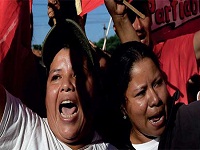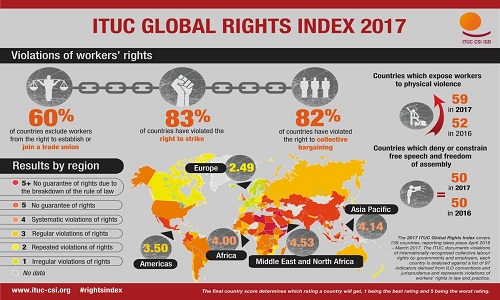"The number of countries experiencing physical violence and threats against workers has risen by 10 per cent in just one year, says the annual ITUC Global Rights Index. Attacks on union members have been documented in 59 countries, fuelling growing anxiety about jobs and wages. The report shows corporate interests are being put ahead of the interests of working people in the global economy, with 60 per cent countries excluding whole categories of workers from labour law."

The number of countries experiencing physical violence and threats against workers has risen by 10 per cent in just one year, says the annual ITUC Global Rights Index. Attacks on union members have been documented in 59 countries, fuelling growing anxiety about jobs and wages. The report shows corporate interests are being put ahead of the interests of working people in the global economy, with 60 per cent countries excluding whole categories of workers from labour law.
Denying workers protection under labour laws creates a hidden workforce, where governments and companies refuse to take responsibility, especially for migrant workers, domestic workers and those on short-term contracts. In too many countries, fundamental democratic rights are being undermined by corporate interests, says Sharan Burrow, ITUC General Secretary. The ITUC Global Rights Index 2017 ranks 139 countries against 97 internationally recognised indicators to assess where workers' rights are best protected in law and in practice.

Working people are being denied basic rights through which they can organise and collectively bargain for a fair share. This, along with growing constraints on freedom of speech, is driving populism and threatening democracy itself, said Sharan Burrow. The report ranks the 10 worst countries for workers' rights in 2017 as Bangladesh, Colombia, Egypt, Guatemala, Kazakhstan, the Philippines, Qatar, South Korea, Turkey and the United Arab Emirates.
Bangladesh, an example
The country’s garment industry produces low-cost items and massive profits for a range of international brands, including Tommy Hilfiger, Calvin Klein and Gap. The industry employs about 4.5 million workers, 80 per cent of whom are young girls from rural areas. In fact, one in every eight Bangladeshi directly or indirectly depends on the textile industry. Bangladesh’s garment workers are the lowest paid in the world, receiving just 5,300 takas ($68) per month. While hazardous roads and chronic power shortages are a serious problem for the garment industry, international retailers and investors are attracted by the country’s poverty-level wages.
Despite many promises from employers, wages have not improved in the past four years. A recent report cited, one of the employees, Ashik and his wife Rahinur, who worked in a factory producing clothes for international retailers such as H&M and Zara, were sacked for joining demonstrations demanding wage increase last December. They worked 14 hours a day but earned only $193 a month between them. Their wages were just enough to cover food and rent but not health care. Having lost their jobs, they could now only afford rice and some dried fish.
Need for stringent government policies
The challenge is for governments to accept their responsibility to govern for people, not just in the interests of big business, by making laws that respect international labour standards. Even under the most oppressive circumstances, workers will continue to organise unions, and it's time that politicians stood up for them instead of trampling on their rights, said Burrow.












